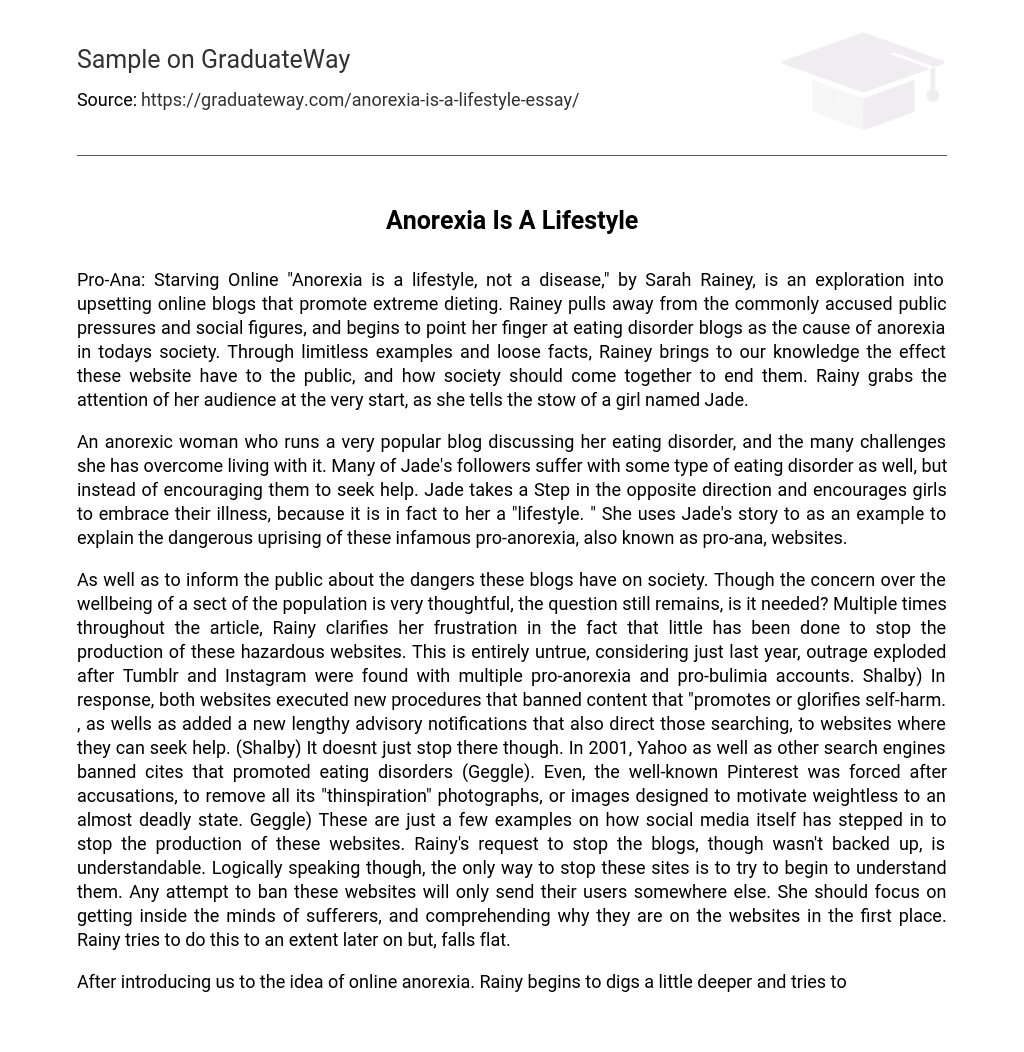Pro-Ana: Starving Online “Anorexia is a lifestyle, not a disease,” by Sarah Rainey, is an exploration into upsetting online blogs that promote extreme dieting. Rainey pulls away from the commonly accused public pressures and social figures, and begins to point her finger at eating disorder blogs as the cause of anorexia in todays society. Through limitless examples and loose facts, Rainey brings to our knowledge the effect these website have to the public, and how society should come together to end them. Rainy grabs the attention of her audience at the very start, as she tells the stow of a girl named Jade.
An anorexic woman who runs a very popular blog discussing her eating disorder, and the many challenges she has overcome living with it. Many of Jade’s followers suffer with some type of eating disorder as well, but instead of encouraging them to seek help. Jade takes a Step in the opposite direction and encourages girls to embrace their illness, because it is in fact to her a “lifestyle. ” She uses Jade’s story to as an example to explain the dangerous uprising of these infamous pro-anorexia, also known as pro-ana, websites.
As well as to inform the public about the dangers these blogs have on society. Though the concern over the wellbeing of a sect of the population is very thoughtful, the question still remains, is it needed? Multiple times throughout the article, Rainy clarifies her frustration in the fact that little has been done to stop the production of these hazardous websites. This is entirely untrue, considering just last year, outrage exploded after Tumblr and Instagram were found with multiple pro-anorexia and pro-bulimia accounts. Shalby) In response, both websites executed new procedures that banned content that “promotes or glorifies self-harm. , as wells as added a new lengthy advisory notifications that also direct those searching, to websites where they can seek help. (Shalby) It doesnt just stop there though. In 2001, Yahoo as well as other search engines banned cites that promoted eating disorders (Geggle). Even, the well-known Pinterest was forced after accusations, to remove all its “thinspiration” photographs, or images designed to motivate weightless to an almost deadly state. Geggle) These are just a few examples on how social media itself has stepped in to stop the production of these websites. Rainy’s request to stop the blogs, though wasn’t backed up, is understandable. Logically speaking though, the only way to stop these sites is to try to begin to understand them. Any attempt to ban these websites will only send their users somewhere else. She should focus on getting inside the minds of sufferers, and comprehending why they are on the websites in the first place. Rainy tries to do this to an extent later on but, falls flat.
After introducing us to the idea of online anorexia. Rainy begins to digs a little deeper and tries to get nto the world of these websites. She talks to a retired blog owner and has countless interviews with doctors and psychiatrists. She does an excellent job describing all the nitty gritty details about the cause and effects behind all of these sites and giving us some information to support herself. The thing is though, Rainy does all these positive things, and then gives us completely irrelevant information.
For example, she mentions only one case study by Dr, John Morgan, who we know little to nothing about, and talks about a study he onducted on only 1 20 eating disorder patience to see the effects pro-ana websites have on the human mind. (Rainy) Though, the study gives us great background knowledge over the negative effects, it was one study based off of the reactions of only 120 people. Rainy specifically states that in Britain alone there are 1. 6 million people who suffer with an eating disorders. Then she shows us a study that uses less than 200 people.
To be even pickier she uses a study based of the reaction of people who already have an eating disorder, not the everyday people she is reaching out to. After giving us the information about the case study, Rainy begins to jump on her wagon of slamming multiple pro-ana facts in the readers face. Jumping from one point to the other and out of nowhere states things like “Lots of them (anorexics) wear colored bracelets. “(Rainy) What does that have to do with anything? Again, she provides useless information. Another example is, halfway through Rainy decides to quote a doctor that completely changes the main point of her entire article. Anorexia is a lifestyle, not a disease” starts out as an article ade to inform readers on how these websites, blogs, forums, all cause eating disorders. Yet, Rainy goes and quotes Dr Helen Sharpe, another doctor we know nothing about, and she specifically states that these websites are “‘incredibly common, and though they don’t cause eating disorders, they can perpetuate them”. (Rainy) She used a quote that had nothing to do with what she was talking about. This is not the only time Rainy contradicts herself though. Her, herself quotes “Writing about the rise of pro-ana and pro-mia, however, is double-edged.
There is a danger that any attempt to understand the appeal of the websites will only raise their profile. ” (Rainy) She clearly States that people shouldn’t write about pro-anan websites, while she is writing about pro-ana websites. Overall the entire article is everynhere. It’s like seven different people tried writing the article all at once and just published it. I think she did an outstanding job engaging the readers, and being sympathetic towards a very sensitive subject. But, everything from her facts, and statistics fell short. Through limitless examples and loose facts,
Rainey attempted to bring to our attention the effect pro-ana website have to the public, and how society should come together to end them.





